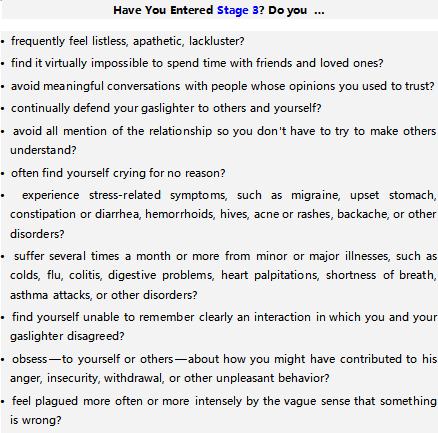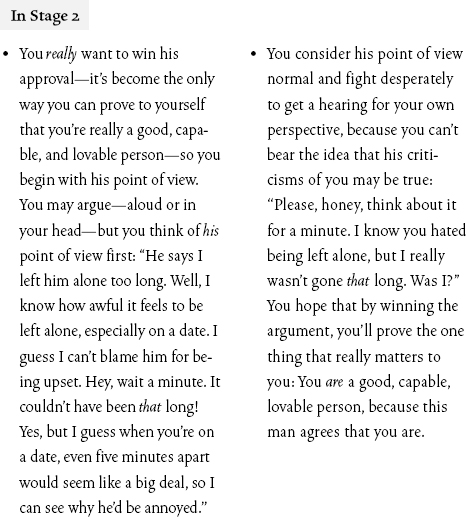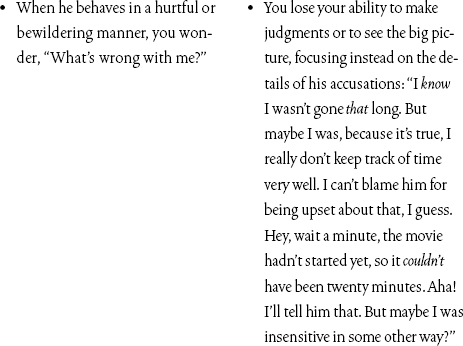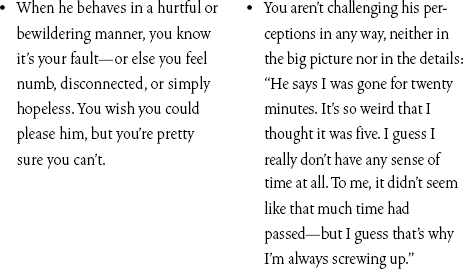Chapter 5 - Stage 3: "It's All My Fault!"
It was a rainy day in April when Gail, a fashionable, dynamic woman in her forties who ran a successful catering service in Los Angeles, stood staring at the shelf in her local pharmacy. She found herself thinking about ipecac, a liquid given to children to induce vomiting when they swallow something poisonous. She knew her boyfriend, Stuart, wanted Chinese food for dinner; maybe he wouldn't notice the taste if she mixed it into his pork fried rice. She imagined the peace and quiet she could enjoy with him throwing up in the bathroom all night. She looked over at the pharmacist's counter. She couldn't believe what she was thinking.
Stuart yelled at her nightly and questioned her judgment about everything. She knew that tonight would be really bad; she wanted to go to an upcoming food convention, but she also knew Stuart would tell her that there was no point to her going because she had no idea how to run a business, and that she was just trying to get away from him. What about their time together? Didn't she have any consideration for him? She couldn't stand the way her head would ache and her heart would pound when he yelled. But she was always abandoning the people she loved; that's what Stuart said, and maybe he was right. And for so many reasons, she couldn't imagine breaking up with him. He said they were soul mates; her family loved him; the sex was great; they owned an apartment together; and more than anything, she knew that if she could make him feel more secure, he would be kinder and gentler to her.
She took a deep breath and left the pharmacy. She could never do that to him. He was right about her anyway. She kept hearing his voice over and over in her head. It was ridiculous to go to the food convention when all he wanted was to be with her. Gail was in Stage 3.
JILL WAS AN intense young woman in her early twenties, with a café-au-lait complexion and dark, wavy hair. The first time she came to see me, she could barely finish a sentence. Agitated and tense, she'd urgently spit out a few words. Then, as though she'd suddenly run out of energy, she'd let her voice trail off and her gaze wander. Throughout the confused maze of incidents, details, and attempts to sum things up, I was able to pick up one recurring theme: I don't recognize myself anymore.
Jill had been a budding journalist who produced nightly news reports for a major TV station. But when a reorganization hit her company, she'd been transferred to a team that was responsible for producing longer features and in-depth series. Whereas her first supervisor had admired Jill and appreciated her talents, her new boss seemed threatened by her. As the story emerged, I saw that he had effectively gaslighted Jill. From a confident, ambitious, and talented young woman, she had become a virtual basket case: nervous, uncertain, and profoundly bitter.
"I thought I was such hot stuff, but it looks like I'm nothing," she said to me. "Why did everybody make such a big deal about me those first few years out of college? Why did they lead me down the garden path if I'm such a …" Her voice trailed off again.
Jill was mired deep in gaslighting's Stage 3, the phase in which you have assimilated your gaslighter's perspective and use it as your own. In Stage 1, as we've seen, you marshal evidence against your gaslighter, trying to show him that he's wrong. You may or may not fear his Emotional Apocalypse, but you definitely feel the Urge to Merge and look for ways the two of you might agree. In Stage 2, you argue with him and with yourself more desperately. Feeling a greater fear of his Emotional Apocalypse and a more urgent sense of the Urge to Merge, you try even harder to make your two points of view align. By Stage 3, you've adopted your gaslighter's point of view and are marshaling evidence on his behalf, not your own. That's because you still believe that you need your gaslighter to feel better about yourself, to boost your confidence, or to bolster your sense of who you are in the world. And in Stage 3, you're not only willing to consider your gaslighter's perspective, you're actively taking it on.
Thus, when I mildly questioned Jill's assessment of her own abilities, reminding her of the awards she'd won and the promotions she'd received during her first few years in her field, she angrily told me I didn't know what I was talking about and proceeded to lecture me—clearly, in her boss's terms—about her terrible failings.
Jill had become so invested in her boss's ability to see her clearly and judge her accurately that she was embracing his perspective—even at her own expense. She needed to believe her boss had this magical power because she still hoped that, one day, she'd get him to see how good she really was. Feeling terrible about how little he thought of her now and abdicating her own judgment about her abilities was worth it to her so that she could hold on to the hope that someday he'd think she was a good journalist. Then she could finally relax, secure in the knowledge that she was a good journalist.
Much of my work with my patients in gaslighting relationships centers on keeping them from moving into Stage 3, because this is a phase in which gaslightees are often also getting many other kinds of abuse. Besides being asked to agree to perceptions that don't ring true, they're frequently being yelled at, taken advantage of, and otherwise exploited. This is possible—even for women who were once strong and independent—because the Stage 3 gaslightee has simply given up. She's accepted, usually without realizing it, that she lives in a world in which the gaslighter gets to make all the rules and those rules can change at a moment's notice. She becomes nervous about making any move because she can never be certain what to expect.

Let's look yet again at that example of keeping your date waiting in the movie theater while you go to get a drink of water. Here's how you might handle such an incident in Stage 2, and how it might go in Stage 3.
From Stage 2 to Stage 3




Stage 3: When Defeat Feels Normal
As with your entry into Stage 2, your transition into Stage 3 may pass imperceptibly. Indeed, one of the greatest dangers of Stage 3 is your increased loss of perspective. Feeling defeated, hopeless, and joyless may now come to seem so normal that you can't quite remember your life ever was any other way. Even if you have some distant notion that things have changed, you may want to resist memories of another, better time, which only make you feel worse about how things are now. Likewise, you may want to avoid the people and relationships that could "bring you back to life." It may seem too painful to open up, even temporarily, when staying in your gaslighting relationship demands that you remain shut down.
Stage 3 gaslighting is truly soul-destroying. Some of my patients describe a listlessness that spreads through almost every area of their lives—food no longer tastes good, they no longer enjoy time with their friends, a lovely walk in the countryside leaves them unaffected—until finally, all of life has lost its savor. Other patients talk about a growing inability to make even the smallest decisions: where they'd like to eat lunch, what movie they'd prefer, which clothes they want to wear that morning. Still others describe a lack of connectedness; they feel as though some other person were living their lives, going through the motions while they are hiding deep within themselves, trying not to be found.
To me, the worst aspect of Stage 3 is the hopelessness. Like all gaslightees, you have idealized your gaslighter and wish desperately for his approval. But by Stage 3, you've pretty much given up on believing that you'll ever get it. As a result, you think the worst of yourself.
Melanie, for example, the Stage 3 gaslightee whose husband, Jordan, berated her so angrily over not getting the right salmon for his dinner party, spent the worst part of her marriage feeling confused, overwhelmed, preoccupied, and numb. As we explored these feelings together, she came to see that, to a large extent, they were the result of emotional and physical exhaustion.
"Every time I even think about disagreeing with Jordan, I stop myself," she told me. "I know he'll just hit me with all those questions—battering me with his words and his insults and his reasons and his logic—and I just don't have the energy to keep fighting any more. I know he's going to win—he always does—so what's the point? It's easier to give in, and it's easier still to try to keep the fight from ever happening by trying to figure out what he wants and then just doing it."
I asked Melanie how she felt about being in a relationship where she saw herself as so unable to affect the other person.
"I don't know," she said listlessly. "What difference does it make how I feel? This is just the way it is."
A few weeks later, the question came up again. This time, Melanie fought back the tears. "I just hate it, all right?" she said to me. "I hate feeling that no matter what I do, no matter how nice I am, no matter how hard I try, it won't make any difference. Jordan is going to think the way he wants to think, and I just can't get through to him. I wish he would love me the way he used to; he used to be really nice, and I miss those days. And I thought if I just tried harder, we could get back there. But now I'm just exhausted. I would try again, I guess, if I thought it would do any good. But clearly, I'm not good enough for him. I don't know why he's stayed with me this long."
Melanie had completely bought into Jordan's opinion of her as incompetent and careless, and she was terrified of his Emotional Apocalypse—belittling. As you'll recall from Chapter 1, Jordan frequently told his wife how stupid and inconsiderate she was. From Melanie's point of view, she had two choices: either disagree with Jordan and start a battle she knew she could never win, or simply give in and agree with his bad opinion of her.
If Melanie had not so desperately wanted Jordan's approval of her as a capable wife worthy of his love, she might have seen a third choice. She might have been able to step back and be critical of him rather than of herself. Perhaps she could have said to herself, "I don't see why nothing I do is good enough for this man. Maybe he's just unreasonable and hard to please." She might have questioned whether she really wanted to be married to such a difficult, demanding partner. And she might have been able to opt out of the endless conversations in which she was continually criticized. (I'll give you a step-by-step plan for doing this in Chapter 6.)
But Melanie, like all gaslightees, had idealized her gaslighter. She had been deeply in love with Jordan when they married, and she'd seen their relationship as her haven, her place to feel safe and protected. In that way, Melanie was prone to the Urge to Merge. She wanted to be married to a strong man with whom she'd never have to disagree because they would always see things the same way.
The possibility that she might have been wrong about this—that her judgments about Jordan were simply not correct and her idea of marriage might not be so healthy—felt too threatening even to consider. "If he's not the man I thought he was, well, then the whole thing was just a lie," she told me once, roused to unusual anger. "I'll never believe that—never! It's not his fault. It's mine!" Because Melanie needed to believe that Jordan was a wonderful, loving husband whom she could always trust implicitly, and because she really couldn't please him, she had fallen into Stage 3 gaslighting. Indeed, she had come to therapy hoping I could "fix" her so that she'd be a better wife for Jordan. "If I just get better," she kept saying, "then maybe we could go back to the way things used to be."
The Three Types of Gaslighters in Stage 3
Just as each type of gaslighter has his own version of Stage 2, so is he likely to have his own version of Stage 3. You may experience different types of Stage 3 gaslighting depending on whether you're involved with an Intimidator, a Glamour Gaslighter, or a Good-Guy Gaslighter.
1. Intimidator Gaslighters
Just as Melanie sought to please Jordan, Jill longed for the approval of her new boss. When she'd started working for him, she'd hoped to impress him with her talent and skill. After all, hadn't she graduated at the top of her class from a prestigious journalism school? Hadn't she already won several awards for her work? And hadn't her previous boss praised her and written her a glowing recommendation? Jill had every reason to expect that her new boss would be thrilled with her hardworking, ambitious approach to the job.
Unfortunately for Jill, her new boss seemed threatened by her. When Jill told me he was a quiet, reserved man who rarely spoke, I wondered if he had trouble with her direct, intense, no-nonsense approach. Or perhaps racial and/or gender attitudes were involved. Whatever the reason, it was clear from day one that this new executive producer did not enjoy working with Jill and was not going to give her the kinds of top assignments she'd come to expect.
At first, Jill took her new boss's attitude as a challenge. She worked harder than ever to impress him, wanting desperately to win his approval, as she had been able to do with her last boss. Jill's version of the Urge to Merge was imagining a boss who would basically be in tune with her own values and judgments: If she really was doing a good job, he would recognize that and express his approval. She refused to accept that her boss might be too unreasonable to appreciate her good work, or that his idea of "good work" might be very different from her own.
So Jill prepared long memos explaining her ideas and sought one-on-one meetings with her boss to make a case for her projects. When he avoided answering her requests, she persisted, insisting on a clear yes or no. To Jill, these were the attributes of a successful journalist. To her boss, they simply seemed like the rude behavior of a pushy woman. The more Jill tried to impress him, the more he backed off.
